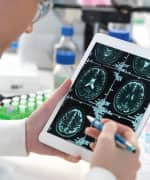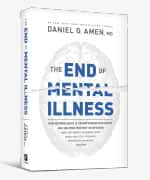Life Extension Magazine®

Mental health conditions like anxiety, depression, bipolar disorders, and PTSD are increasing at an alarming rate.
Dr. Daniel Amen, neuroscientist, board-certified psychiatrist, and founder of Amen Clinics, has developed a radical new approach to diagnosing and treating mental illness. It’s based on one key idea: Get your brain right, and your mind will follow.
In his new book, The End of Mental Illness, Dr. Amen presents a radical new paradigm for understanding emotional health. He discusses the use of specific nutraceuticals to heal the brain and improve its function.
In this eye-opening book, Dr. Amen provides evidence that mental health is connected to brain health.
Utilizing a state-of-the-art, brain-imaging technique called SPECT, Dr. Amen is able to identify the underlying factors causing various mental health issues—which allows him to make use of targeted treatments for true healing.
Over the past 30 years, Amen Clinics has built the world’s largest database of SPECT scans for psychiatric issues, totaling nearly 160,000 scans on patients from 121 countries. Researchers there have also published 70 peer-reviewed scientific studies on SPECT.
This vast database of information has shown Dr. Amen that diagnosing and treating mental illness based on symptoms alone often misses the true cause of illness. It has also demonstrated to him that standard, drug-based treatment protocols rarely improve brain function, while more natural, lifestyle-based approaches can be far more effective.
In The End of Mental Illness, Dr. Amen details his BRIGHT MINDS approach to addressing the underlying factors revealed by the SPECT scans—and provides more than 100 simple ways to heal your brain.
In this interview with Life Extension®, Dr. Amen talks about the importance of brain imaging, discusses how factors like blood flow and aging impact the brain, and provides practical advice for making improvements in factors that can harm brain health.
—Laurie Mathena
LE: Can you talk more about the difference between mental health and brain health?
Dr. Amen: It has become crystal clear to us that, as psychiatrists, we are not dealing with mental health issues, but we are dealing with brain health issues; and this one idea has changed everything we do to help our patients.
Think of it this way. Your brain can have problems just as your heart can have problems. Most people who see cardiologists, however, have never had a heart attack. They are there because they have risk factors—a family history of heart disease, high blood pressure, or too much abdominal fat—and they want to prevent a heart attack.
To end mental illness, we must develop a similar way of thinking. Reframing the discussion from mental health to brain health changes everything. People begin to see their problems as medical, not moral.
Get your brain right, and your mind will follow. In study after study, improving the physical functioning of the brain improves the mind.

LE: How has using brain imaging transformed your treatment of patients with mental illness?
Dr. Amen: In 1991, I went to a lecture on brain SPECT imaging by Jack Paldi, MD, who was the chief of medicine at the hospital where I worked. Dr. Paldi told us that SPECT was a tool to give psychiatrists more information to help their patients.
SPECT looks at blood flow and activity. It looks at how the brain works. It is different from MRI and CT studies that look at brain structure. SPECT looks at brain function.
SPECT basically tells us three things about the activity in each area of the brain: if it is healthy, underactive, or overactive.
Our brain imaging work has completely disrupted how we help our patients get well, and this information can help you, even if no one ever looks at your brain.
LE: How does using brain imaging differ from the standard method of diagnosis?
Dr. Amen: Experienced clinicians can tell if someone is likely to have attention deficit disorder/attention deficit hyperactivity disorder (ADD/ADHD), obsessive compulsive disorder (OCD), or bipolar disorder without the benefit of these tools.
But what clinicians cannot do, and will never be able to do, without functional brain imaging, is to know the underlying brain biology of the patients they treat.
Without imaging your brain, your doctor cannot tell if your inattention, depression, or aggression is from factors such as:
- Low blood flow from vascular disease
- An inflammatory process, related to low omega-3 fatty acids or gut problems
- A brain infection
- Nutrient or neurohormone abnormalities
- Blood sugar abnormalities
If we don’t look at the brain, we are unnecessarily flying blind. That can lead us to miss important diagnoses, give the wrong treatment plan, and hurt the people entrusted to us to help.
LE: Why isn’t the whole of psychiatry on board with brain imaging?
Dr. Amen: Because this new way of thinking completely changes the diagnostic and treatment paradigm that has been taught in medical schools and psychiatric residency training programs for more than 50 years.
Functional brain imaging takes psychiatry from a generalized symptom-cluster diagnostic and treatment specialty without any biological evidence to a more objective specialty, one that is solidly based on using state-of-the-art, brain-mapping tools to help optimize the patient’s brain function.
Besides completely changing the way we diagnose brain health/mental health, functional imaging leads to entirely different treatment protocols to improve brain function.
These include strategies that are often more natural and lifestyle-based and more directly accessible to patients. These types of protocols are not taught in medical schools and are not underwritten by the pharmaceutical industry that has dominated the financial support of the psychiatric establishment.

LE: Based on your extensive collection of data using SPECT, you developed an acronym called BRIGHT MINDS to explain the underly factors involved in brain illness. Can you briefly review what those are?
Dr. Amen: In order for your biology to operate at peak efficiency, its machinery (cells, connections, chemicals, energy, blood flow, and waste processing) needs to work right. The brain is like a supercomputer, with both hardware and software.
Think of the biological circle as the hardware. Within it are the BRIGHT MINDS factors:
- Blood Flow
- Retirement/Aging
- Inflammation
- Genetics
- Head Trauma
- Toxins
- Mind Storms (abnormal brain electrical activity)
- Immunity/Infections
- Neurohormone Issues
- Diabesity
- Sleep
When the brain’s biology is healthy, all these factors work together in a positive way to maximize your success and sense of well-being. When any of the BRIGHT MINDS risk factors are troubled, you are more likely to suffer with a wide variety of symptoms.
LE: Let’s talk a bit more about the first factor: blood flow.
Dr. Amen: Blood flow is critical for life. It transports nutrients, including oxygen, to every cell in your body and flushes away toxins. Anything that damages your blood vessels or impairs blood flow hurts your brain.
Low blood flow on SPECT has been seen with depression, suicide, bipolar disorder, schizophrenia, attention deficit disorder/attention deficit hyperactivity disorder (ADD/ ADHD), traumatic brain injury (TBI), hoarding, murder, substance abuse, seizure activity, and more.
Low blood flow is the number one brain imaging predictor that a person will develop Alzheimer’s disease.
Our brain imaging research has taught us that the number one strategy to support your brain and mental health is to protect, nurture, and optimize your heart and blood vessels.
LE: Do you support the use of supplements to improve various factors involved in brain health?
Dr. Amen: At Amen Clinics we are not opposed to medications for your mind and prescribe them when necessary. However, we are opposed to medications being the first and only thing you do to help your brain and your mind.
I first became interested in using nutraceuticals for brain health/mental health issues once I started using SPECT scans. I could see that some of the medications I was taught to prescribe, especially benzodiazepines for anxiety and opiates for pain, were clearly associated with unhealthy looking scans.
I started looking for less toxic options for my patients and was surprised to find a growing body of scientific literature to support the use of supplements for many brain health/mental health issues.
After nearly 40 years as a psychiatrist, I recommend more and more treatments from nature, including foods and nutraceuticals. We want you to use all the tools available, especially if they are science based, effective, and cheaper, and have minimal side effects.

LE: What are a few supplements you recommend for improving blood flow?
Dr. Amen: Cocoa flavanols improve blood flow, support healthy blood pressure, and improve brain functions, even in those who haven’t had enough sleep.
Omega-3 fatty acids can improve blood flow, brain function, memory, and mood, as well as reduce inflammation and brain shrinkage from aging. There are two active compounds in omega-3s: EPA (eicosapentaenoic acid) and DHA (docosahexaenoic acid). You need both.
LE: What is the surprising connection between infections and brain health?
Dr. Amen: Back in 1991, when I first began using SPECT scans in my practice, I saw many patients who had been diagnosed with conditions like chronic fatigue syndrome and fibromyalgia. Many of these patients’ scans looked terrible, showing overall low blood flow caused by undiagnosed infections.
Clinical evidence now shows that chronic fatigue syndrome is an infectious disease, and I hope more physicians will start testing for infections.
LE: What have the SPECT scans revealed about the impact of aging on the human brain?
Dr. Amen: Brain imaging work at the Amen Clinics has also clearly shown the gravity of age. As your skin starts to sag and wrinkle and show other signs of aging, the same type of process occurs in the brain.
Yet your brain doesn’t have to deteriorate with age if you remain diligent about your health for as long as you want to have a clear and happy mind!
Too often, elderly (let’s say those over 70) people are dismissed with brain health/mental health issues—such as ADD/ADHD, depression, anxiety or memory issues—because they are older; but research has found that no matter what your age, your brain can be better if you put it in a healing environment.
LE: What are some practical ways to combat brain aging?
Dr. Amen: Fasting helps your brain stay healthy because it cleans out the buildup of toxic proteins that damage neurons, reducing inflammation and slowing down aging.
A simple way to do a nightly 12- to 16-hour fast is to eat dinner at 7 p.m., for example, and not eat again until 7 a.m. (or 11 a.m. for a longer fast). Even longer fasts of 24 hours can also be helpful.

LE: What nutraceuticals have you found to be most useful to slow aging’s impact on the brain?
Dr. Amen: N-acetylcysteine (NAC) has shown promising results in people with bipolar disorder, schizophrenia, OCD, and addictions. It can also decrease inflammation and may help delay brain atrophy in Alzheimer’s disease.
Recent clinical trials have found that saffron helps for depression, bipolar disorder, and anxiety. As a potent antioxidant and nerve protector, saffron enhances memory, protects the hippocampus, boosts blood flow and acetylcholine, and fights toxic buildup of the proteins thought to cause dementia.
LE: How would readers find a brain health practitioner who follows your BRIGHT MINDS approach to ending mental illness?
Dr. Amen: My mission has always been to teach other medical and mental health professionals the techniques we have learned at Amen Clinics. We have trained more than 3,000 brain health certified coaches (www.brainhealthcoaching.com).
If you have any questions on the scientific content of this article, please call a Life Extension® Wellness Specialist at 1-866-864-3027.
To find professionals who will have a similar integrative mind-set to the one expressed in The End of Mental Illness, visit https://referraldirectory.amenuniversity.com/.
You can also go to the Institute for Functional Medicine (www.ifm.org) or American Academy of Anti-Aging Medicine (www.a4m.com) websites to see if there is a functional medicine doctor near you.

Daniel G. Amen, MD, is a physician, a double board-certified psychiatrist, the founder of Amen Clinics, and a 10-time New York Times bestselling author. Dr. Amen has written, produced, and hosted 14 popular public television shows about the brain that have aired more than 110,000 times across North America. His work has been featured in outlets includingNewsweek, Time magazine, the New York Times, and Men’s Health.
Taken from The End of Mental Illness by Dr. Daniel G. Amen. Copyright © 2020. Used by permission of Tyndale House Publishers, a Division of Tyndale House Ministries. All rights reserved.
To order a copy of The End of Mental Illness, call 1-800-544-4440.
Item: #34180 • Price: $19.49

